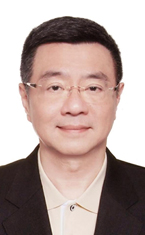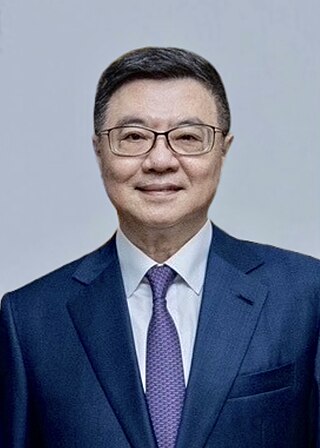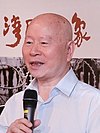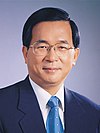
The Democratic Progressive Party (DPP) is a Taiwanese nationalist and centre to centre-left political party in Taiwan. It is currently the major ruling party in Taiwan, controlling both the presidency and the central government, also the dominant party in the Pan-Green Coalition.

Taiwan, officially the Republic of China (ROC), is governed in a framework of a representative democratic republic under a five-power system first envisioned by Sun Yat-sen in 1906, whereby under the constitutional amendments, the President is head of state and the Premier is head of government, and of a multi-party system. Executive power is exercised by the Executive Yuan. Legislative power is vested primarily in the Legislative Yuan. The judiciary is independent of the executive and the legislature. In addition, the Examination Yuan is in charge of validating the qualification of civil servants, and the Control Yuan inspects, reviews, and audits the policies and operations of the government.

The Legislative Yuan is the unicameral legislature of the Republic of China (Taiwan) located in Taipei. The Legislative Yuan is composed of 113 members, who are directly elected for four-year terms by people of the Taiwan Area through a parallel voting system.

The National Assembly was the authoritative legislative body of the Republic of China, from 1947 to 2005. Along with the Control Yuan and the Legislative Yuan, the National Assembly formed the tricameral parliament of the Republic of China.

The Standing Committee of the National People's Congress (NPCSC) is the permanent body of the National People's Congress (NPC), the national legislature of the People's Republic of China. It exercises the powers of the NPC when it is not in session.

The premier of the Republic of China, officially the president of the Executive Yuan, is the head of the government of the Republic of China of Taiwan and leader of the Executive Yuan. The premier is nominally the principal advisor to the president of the republic and positioned as the head of central government.

You Si-kun, also romanized Yu Shyi-kun, is a Taiwanese politician. He was one of the founding members of the Democratic Progressive Party (DPP), and is known to be a strong advocate of Taiwan independence. He led the DPP as chairman from 2006 to 2007 and served as Premier from 2002 to 2005.

The Michigan Senate is the upper house of the Michigan Legislature. Along with the Michigan House of Representatives, it composes the state legislature, which has powers, roles and duties defined by Article IV of the Michigan Constitution, adopted in 1963. The primary purpose of the Legislature is to enact new laws and amend or repeal existing laws.

Chang Chun-hsiung is a Taiwanese politician who had served as the prime minister of Taiwan from 2000 to 2002 and 2007 to 2008, both under Chen Shui-bian's presidency. His appointment by then-President Chen in 2000 marked the first time a Democratic Progressive Party (DPP) member occupied the premiership.

The 72nd United States Congress was a meeting of the legislative branch of the United States federal government, consisting of the United States Senate and the United States House of Representatives. It met in Washington, D.C. from March 4, 1931, to March 4, 1933, during the last two years of Herbert Hoover's presidency. The apportionment of seats in this House of Representatives was based on the 1910 United States census. The Senate had a Republican majority. The House started with a very slim Republican majority, but by the time it first met in December 1931, the Democrats had gained a majority through special elections.

An election for the National Assembly took place in Taiwan on Saturday, 14 May 2005, from 07:30 to 16:00 local time. It elected an ad hoc National Assembly whose only function was to serve as a constituent assembly in order to approve or reject amendments to the Constitution of the Republic of China already proposed by the Legislative Yuan. The results indicated that the amendments would be approved, as the parties supporting them won an overwhelming majority, and indeed the amendments were passed on 7 June 2005.

Local elections were held in Taiwan on 3 December 2005 to elect magistrates of counties and mayors of cities, councillors in county/city councils and mayors of townships and cities, known as the three-in-one elections, on 10 June 2006 to elect representatives in township/city councils and village chiefs, on 9 December 2006 to elect mayors and councillors of special municipalities, and on 30 December 2006 to elect village chiefs in Taipei City.

The Deputy Speaker of the Lok Sabha is the second-highest ranking authority of the Lok Sabha, the lower house of the parliament of India. They act as the presiding authority in the event of leave or absence caused by the death or illness of the speaker of the Lok Sabha.As per Article 93 of the Constitution, it says that the House of the People shall, as soon as may be, choose two members to be Speaker and Deputy Speaker so often as the offices become vacant. However, it does not provide a specific time frame. It is parliamentary convention to elect a deputy speaker of the Lok Sabha from a party other than the ruling party to run an accountable democratic parliament.
In a governmental system, a party leader acts as the official representative of their political party, either to a legislature or to the electorate. Depending on the country, the individual colloquially referred to as the "leader" of a political party may officially be party chair, secretary, or the highest political office.

The Mayor of Tainan is the head of the Tainan City Government, Taiwan and is elected to a four-year term. The current mayor is Huang Wei-cher of the Democratic Progressive Party since 25 December 2018.
The 2006 Democratic Progressive Party chairmanship by-election was held on January 15, 2006 in Taiwan. It was the tenth chairmanship election conducted by the party. In December 2005, chairperson Su Tseng-chang resigned as a result of failing to win ten of the twenty-three positions in the 2005 local elections.

Presidential elections were held in Taiwan on 14 January 2012. The election was held concurrently with legislative elections. It was the fifth direct election for the President of the Republic of China. Prior to 1996, the President was elected by the ROC's National Assembly and not directly by the people.

The Mayor of New Taipei is the chief political executive of the city of New Taipei in Taiwan. The mayor, a new position created when the predecessor entity of New Taipei, Taipei County, was elevated to a special municipality in 2010, is elected to a four-year term. The equivalent position in the former county was Taipei County Magistrate. The incumbent mayor is Hou Yu-ih, who returned to office on 14 January 2024 after a temporary leave of absence for the 2024 Taiwanese presidential election as the Kuomintang nominee.

Cho Jung-tai is a Taiwanese politician who is the premier of Taiwan. He served on the Taipei City Council from 1990 to 1998, when he was first elected to the Legislative Yuan. Cho remained a legislator through 2004, when he was appointed deputy secretary-general to the president during the Chen Shui-bian administration. During Frank Hsieh's 2008 presidential bid, Cho assumed the post of Secretary-General of the Democratic Progressive Party. He returned to public service in 2017, as secretary-general of the Executive Yuan under Premier William Lai. In 2019, Cho succeeded Tsai Ing-wen as leader of the Democratic Progressive Party. He remained leader of the party until May 2020, when Tsai resumed the role.
The Constitutional Council (CC) is a 10-member constitutional authority in Sri Lanka tasked with maintaining independent commissions and monitoring its affairs. The Constitutional Council is aimed at depoliticizing the public service.









































